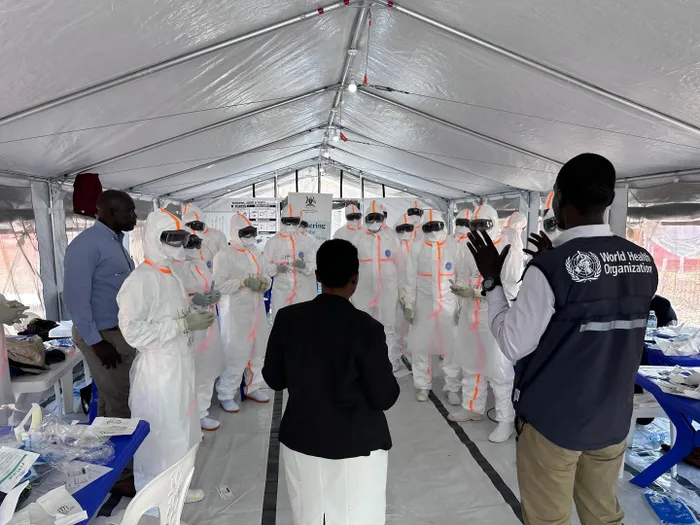
Uganda has declared an end to the Ebola outbreak, less than three months after the virus was confirmed.
Image: X/ WHO African Region
Uganda has declared the end of the Ebola outbreak, which is less than three months after the virus was confirmed in Kampala, Uganda’s capital.
This was Uganda’s second Ebola outbreak in under three years, with confirmation occurring on January 30, 2025.
During the outbreak, 14 cases, 12 confirmed and two probable (not confirmed through laboratory tests), were reported.
Four deaths, two confirmed and two probable, occurred. Ten people recovered. In addition, 534 people were identified as having been in contact with the confirmed and probable cases and were closely monitored.
The 42-day countdown to officially declare the end of the outbreak, as per World Health Organization (WHO) guidelines, was initiated on March 15, 2025, when the last confirmed patient was discharged.
Uganda’s long-standing experience in managing outbreaks enabled a fast, coordinated, and effective response.
The Ministry of Health activated national coordination structures, deployed rapid response teams, strengthened surveillance systems and established treatment units, with support from WHO and partners.
Border health measures were reinforced to prevent cross-border transmission, particularly in Kampala and entry points.
More than 130 national and international staff were mobilised by WHO to support the response in areas of case investigation, contact tracing, laboratory diagnostics, and case management. Over 1 500 samples were tested with WHO providing logistics, training and quality assurance to ensure biosafety.
To reduce stigma, build trust and work with affected communities, which played a critical role in driving behaviour change, the WHO facilitated the deployment of Emergency Medical Teams and anthropologists.
“This outbreak challenged us in new ways. It touched both urban and rural communities across the country and unfolded against the backdrop of significant global funding constraints,” said WHO African Region acting director Dr Chikwe Ihekweazu.
“The response demonstrated Uganda’s long-standing leadership in tackling public health emergencies. As WHO, we are extremely proud to have supported these efforts every step of the way.”
The Sudan virus disease (SVD) subtype of the Ebola strain, which was recently contained in Uganda, is a severe illness that can often be fatal to humans and other primates. During past outbreaks, SVD killed 4 out of 10 infected people.
Despite no licensed countermeasures against this Ebola species, candidate vaccines are in various phases of clinical trials.
Within four days of the Ugandan government’s declaration of the outbreak, a randomised clinical trial for vaccine safety and efficacy using the ring vaccination approach was launched. Additionally, the administration of Remdesivir treatment under the Monitored Emergency Use of Unregistered and Experimental Interventions (MEURI) protocol was initiated.
“Uganda’s leadership and resilience were crucial in containing this outbreak,” said WHO representative in Uganda Dr Kasonde Mwinga.
“From day one, WHO worked hand-in-hand with the Ministry of Health, deploying expertise, providing essential supplies, and ensuring every suspected case was investigated. The people of Uganda have shown extraordinary resolve.”
In addition, the Ministry of Health, with the continued support of WHO and partners, will still invest in surveillance, survivor care, and preparedness to ensure Uganda remains safe, even though the outbreak is over.
Meanwhile, WHO director-general Dr Tedros Adhanom Ghebreyesus thanked and congratulated the Ministry of Health for its leadership and commitment and the many health workers who protected their communities despite the risks.
“When the first case was confirmed, WHO deployed experts within 24 hours to support the ministry in all aspects of the response. We mobilised 129 local and international staff, coordinated partners; helped to scale up laboratory capacity; provided essential supplies; and supported community engagement,” Ghebreyesus said.
“The outbreak is over, but the threat remains.
“WHO remains committed to strengthening surveillance, readiness and rapid response systems in Uganda and across the region.”
Ghebreyesus said together they have shown that with speed, coordination and support under government leadership, they can stop outbreaks in their tracks.
thobeka.ngema@inl.co.za
Related Topics:
